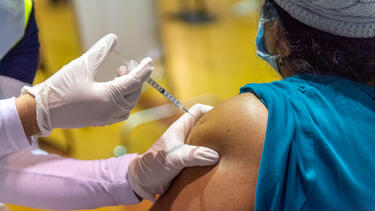The Vaccines Bring Hope—and New Questions
A year into the COVID-19 pandemic, vaccines are a reality—and now we face the logistical and medical complications of inoculating a vast population while infection rages and the virus mutates. We asked Yale SOM’s Dr. Howard Forman, a public authority on the pandemic, for an update.

Photo: Johnny Milano/Bloomberg via Getty Images
What policy changes do we need to make sure that vaccines reach as many people as possible?
“We must invest in vaccine acceptance. That acceptance goes down when low-wage workers are sacrificing income to get a vaccine, so we must provide federally subsidized time off for them.”
Through all legal means (including the Defense Production Act), we need to ramp up production of vaccines and the tools to distribute and administer them. It would be hard to overstate how much earlier vaccination can help reduce deaths, hospitalizations, and further mutations. We need to make certain that our distribution abides by principles of health equity: states and municipalities should be judged on these measures. We must invest in vaccine acceptance. That acceptance goes down when low-wage workers are sacrificing income to get a vaccine, so we must provide federally subsidized time off for them.
How do the virus variants and the vaccine results from Novavax and Johnson & Johnson change the picture?
Both of these trials were the first to include populations affected by the novel variants (UK, South Africa, Brazil) that appear to be more infectious. This may account for some of the reduced “efficacy” measured. But in both cases, the vaccines ultimately helped avoid hospitalizations and death—and that is, ultimately, the most important metric of success, in my opinion.
Are we on track to return to work and school this fall and avoid another winter wave?
We have a lot of work to do between now and the fall. If we can get everyone vaccinated, get final approval from the FDA for existing vaccines, and mitigate spread, we can reduce further mutations. If we can avoid allowing for true vaccine evasion by new mutations, we can enter the fall in a very strong position. We will still likely need booster shots, but the mRNA platform companies (Moderna and Pfizer) can rapidly develop and produce them, assuming that the FDA is accommodating in its regulatory policy. A lot still must be determined, but I am not losing hope.
Ask Dr. Forman
Howard Forman provides pandemic updates and answers questions on Twitter at @thehowie, and is hosting frequent Q&A sessions on the audio app Clubhouse. If you’re a member, you can follow him at @thehowie to get updates on his upcoming appearances.